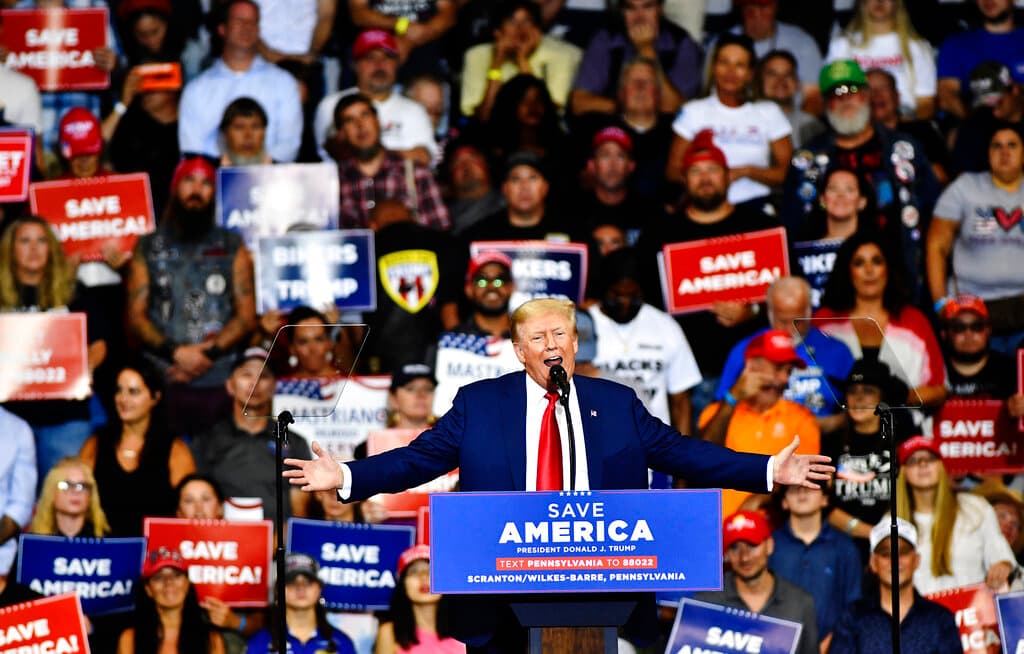Can President Trump Get a Fair Trial?
With charges being predicted in one or more criminal cases, who is fit to decide the president’s fate?

Can President Trump get a fair trial in front of a jury of his peers? That question is coming into focus as criminal investigations — from Mar-a-Lago to Georgia to the District of Columbia — get to the point where an indictment could be handed up at any time.
The issue of who is qualified to sit in judgment of a man who could be the most famous in the world has already been raised in a courtroom, as jury selection wrapped up Thursday in a criminal tax fraud trial of the organization that bears Mr. Trump’s name.
New York State’s lead prosecutor, Susan Hoffinger, put the problem succinctly to the state supreme court justice who is hearing the case, Juan Manuel Merchan: “If we were to strike every juror who had a negative opinion about Donald Trump, we wouldn’t be able to get a jury at all.”
That thesis was apparently borne out at voir dire, the process by which jurors are chosen. According to Insider, one juror mused that Mr. Trump was “funny” before he was elected and then “started acting a little crazy and narcissistic” during his presidency. “Not so much policy,” the man reflected. Two other jurors expressed disapproval of Mr. Trump.
While Mr. Trump is not in the docket in the New York based case, his one-time chief financial officer, Alan Weisselberg, has pleaded guilty and is a lynchpin of the government’s case. Ms. Hoffinger insists that the case “is not about Donald Trump.” For his part, Mr. Trump has lambasted the trial as a “political witch hunt.”
The Constitution’s Sixth Amendment promises the right to “an impartial jury.” The right has also been sourced to the Equal Protection and Due Process clauses of the 14th Amendment. This means that the jury pool must be drawn from a representative cross section and that the jurors themselves be unbiased.
The challenge that Mr. Trump presents to the requirement that a jury be impartial has already surfaced in another case orthogonal to the former president that nevertheless was haunted by his specter. The special counsel John Durham’s prosecution of Democratic lawyer Michael Sussman for lying to the FBI ended in acquittal after a trial at Washington, D.C.
In the 2016 presidential election, 90.9 percent of voters in the nation’s capital voted for Secretary Clinton. According to the Hill, one juror in the Sussman trial admitted that he was a donor to Mrs. Clinton in 2016, but promised to “strive for impartiality as best I can.” Another juror’s husband had worked for Mrs. Clinton in the past, and a third derided the legal system as tainted by racism and advocated to defund the police.
As a federal case out of New Jersey put it eight decades ago, the “entire effort of our criminal (civil too) procedure is to secure a jury which is ignorant of repute either in its sense of character or in its sense of events.” In order to bring this effort to fruition, efforts are made to “empty the minds” of the jury to make it an “impartial organ of justice.”
The Sixth Amendment dictates that the “impartial jury” must be harvested from the “state and district wherein the crime shall have been committed.” Judges have taken this to mean that the defendant’s fate is determined in the place where the essential elements of the offense are alleged to have occurred.
The United States code informs that if criminal conduct took place in more than one place, “any district in which such offense was begun, continued, or completed” is suitable for trial. This allows for some leeway in the choice of venue, a menu of options known as “forum shopping.”
That statute is likely top of mind for the Department of Justice prosecutors weighing where to bring the case against Mr. Trump for keeping presidential documents at Mar-a-Lago. While the documents were stashed at the Florida compound, the government could feel more comfortable prosecuting the case at Washington, D.C.
That strategy could be risky, as Mr. Trump would almost certainly move for a dismissal of the charges based on improper venue. Still, the case appears to be gravitating north. CNN reports that former advisers to Mr. Trump have appeared before a grand jury in the District, and a closed door meeting between prosecutors and Mr. Trump’s team transpired in a courthouse there this week.

